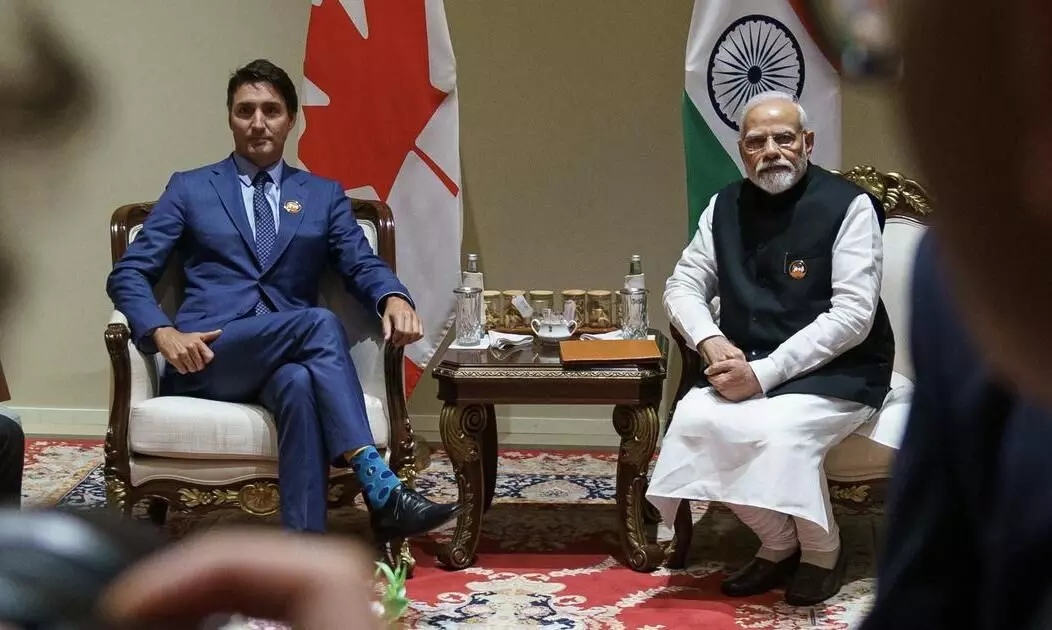
Canada ignored India's extradition requests for alleged terrorists, say officials
text_fieldsCanadian PM Justin Trudeau and Indian PM Narendra Modi (file photo)
Canada has been criticised by Indian officials for continuing to ignore extradition requests for several individuals allegedly involved in terrorism and gang-related activities.
Indian officials have handed over multiple dossiers to the Canadian authorities, but these requests have remained unaddressed.
Among the concerns raised by India is the presence of at least nine separatist organisations with alleged ties to terror groups operating freely in Canada.
These groups, including the World Sikh Organization (WSO), Khalistan Tiger Force (KTF), Sikhs for Justice (SFJ), and Babbar Khalsa International (BKI), are believed to be working in collaboration with Pakistan.
India has refuted allegations made by Canadian authorities and politicians related to the murder of Hardeep Singh Nijjar, a Canadian citizen and Khalistani terrorist. Indian officials assert that these allegations are based on unsubstantiated assumptions.
Despite ongoing diplomatic efforts and discussions on security matters, Canadian authorities have not taken decisive action against these terror elements, according to Indian officials. Multiple dossiers containing evidence have been submitted, but the Canadian government has not acted upon the deportation requests.
India has identified eight individuals involved in terrorist activities and an equal number of gangsters believed to be conspiring with Pakistan's spy agency, the ISI, who have found refuge in Canada. Among these individuals is Gurwant Singh, who was involved in terrorist activities in the early 1990s and is the subject of an Interpol Red Corner Notice.
Indian authorities have also requested the deportation of Gurpreet Singh, another individual linked to terror cases, providing his Canadian address, but no action has been taken.
Deportation requests for notorious gangsters, including Arshdeep Singh (alias Arsh Dalla), wanted in 16 criminal cases, and Satinderjit Singh Brar (alias Goldy Brar), who claimed responsibility for the killing of popular Punjabi singer Sidhu Moose Wala, have been submitted with supporting evidence but have not been acted upon by the Canadian government.
These separatist organisations in Canada have openly issued assassination threats, promoted separatist agendas, and carried out targeted killings in India.
Other Canada-based wanted terrorists include Gurwant Singh Bath (of the Dashmesh regiment of Khalistan), Bhagat Singh Brar (son of Pakistan-based terrorist Lakhbeer Singh Rhode), Moninder Singh Bual, and Satinder Pal Singh Gill.
Hardeep Singh Nijjar, a designated terrorist by the Union Home Ministry, had a cash reward of Rs 10 lakh on his head. He was affiliated with the now-banned Khalistan Tiger Force (KTF) and fled India in 1997 after assuming a fake identity.
In 2013-14, Nijjar visited Pakistan, where he collaborated with Jagtar Singh Tara of the Khalistan Tiger Force (KTF), wanted in the assassination of Punjab's former Chief Minister Beant Singh. Nijjar was roped in by the ISI to organise secret training camps for Sikh extremist groups associated with the Khalistan movement in British Columbia.
Canada's current diplomatic standoff with India appears to be motivated by domestic political issues and the declining popularity of the government. The expulsion of an Indian diplomat seems aimed at garnering support from the Sikh population, especially those with pro-Khalistan sentiments, claimed the officials.
The role of Jagmeet Singh Dhaliwal, an MP from Burnaby South, and his affiliation with the New Democratic Party of Canada, which supports the Khalistan referendum, has been highlighted. Dhaliwal was previously blacklisted for his anti-India activities.
Officials also pointed to the murder of another Canadian citizen, Ripudaman Malik, who faced threats from Nijjar and Sikhs for Justice due to his involvement in printing Shri Guru Granth Sahib. Malik was later killed by unidentified gunmen.
According to officials, Nijjar's murder was a result of internal rivalry between various groups.
Canadian officials reportedly sought public condemnation of the murder of Sikh separatist leader Hardeep Singh Nijjar from their allies, including the United States, weeks before making allegations implicating Indian officials in the killing.
Canada's Foreign Minister Melanie Joly stated that Trudeau had raised the allegations with President Biden and British Prime Minister Rishi Sunak, with the topic expected to be discussed at the UN General Assembly, reported The Washington Post.
In response, Washington expressed deep concern and emphasised the importance of Canada's investigation and bringing the perpetrators to justice. Australia also raised the issue with India at senior levels.
South Asia analyst Michael Kugelman pointed out the dilemma facing Western governments, acknowledging Canada as an ally while valuing their strategic partnership with India.
According to the report, India had been pressuring countries with significant Sikh communities, such as Canada, Australia, Britain, and the United States, to crack down on the Khalistan movement. Pro-Khalistan protests had occurred in London and San Francisco, causing tension with the Indian government.























